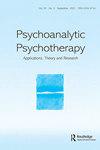Editorial
IF 1.2
Q1 PSYCHOLOGY, PSYCHOANALYSIS
引用次数: 0
Abstract
In part 2 of this special issue we continue our series of papers from the celebration events for the centenary of the Tavistock Clinic. Exploring the theme of inequalities, the first paper in this issue is entitled ‘Pandemic: challenges in care and recovery’ by Dinesh Sinha. It has long been known that economic disadvantage is linked to higher rates of mortality and poorer access to healthcare (Black, 1982). More recent evidence has suggested that industrialised societies with the greatest income differentials (such as the UK and USA) have the poorest health and social development (Wilkinson & Pickett, 2009). The COVID-19 pandemic, which delayed the Tavistock centenary celebrations, has highlighted once again the inequalities in health within our society. Using the lens of everyday sadism, Sinha identifies corrosive and deliberate counter narratives to the themes of care and courage in this period. He describes how the pre-existing silos of separation between the privileged and dispossessed have prevented survival and wellbeing in the wider society. He cautions health and social care workers about the possible lapse into masochism and bravery as defences against exhaustion and the guilt of having survived when thousands of our colleagues have not. He highlights the need for awareness of our own feelings of guilt and aggression, so that they do not vitiate our capacity to care. Sinha suggests that the process of recovering from the pandemic is not just about the restoration of physical wellbeing but also the creation of healthier conditions in society that actively mitigate the scourge of everyday sadism. The next paper, ‘Under fire in the consulting room’ by Carine Minne, describes her work with patients at the Portman Clinic. The clinic traces its history back to 1933, when the ‘Psychopathic Clinic’ was founded by Edward Glover at the West End Hospital for Nervous Diseases. It was established as the clinical arm of the Institute for the Study and Treatment of Delinquency (ISTD), earlier founded in 1931 as the Institute for the Scientific Treatment of Delinquency. The Institute had been inspired by the work of Dr. Grace Pailthorpe, a psychiatrist and psychoanalyst, who worked in Birmingham and Holloway Prisons. There, she became interested in the personality of women prisoners and in 1932 published Studies in the Psychology of Delinquency. In her article Minne uses clinical vignettes with patients such as a woman who was convicted of infanticide. She illustrates situations when the therapist realised there was a sudden unexpected rise in the ‘temperature’ of a patient’s mind. She likens this to the ignition of a fuse and discusses why this may have Psychoanalytic Psychotherapy, 2022 Vol. 36, No. 1, 1–3, http://dx.doi.org/10.1080/02668734.2022.2049064社论
在本期特刊的第二部分中,我们将继续我们的系列论文,这些论文来自塔维斯托克诊所百年庆典活动。本期的第一篇论文探讨了不平等的主题,题为“流行病:护理和康复中的挑战”,作者是Dinesh Sinha。人们早就知道,经济劣势与较高的死亡率和较差的医疗保健机会有关(Black, 1982年)。最近的证据表明,收入差距最大的工业化社会(如英国和美国)的健康和社会发展最差(Wilkinson & Pickett, 2009)。2019冠状病毒病大流行推迟了塔维斯托克百年庆典,再次凸显了我们社会中健康方面的不平等。辛哈用日常虐待狂的镜头,识别出这一时期关心和勇气主题的腐蚀性和故意的反叙述。他描述了先前存在的特权阶层和被剥夺者之间的隔离如何阻碍了更广泛社会的生存和福祉。他告诫卫生和社会护理工作者,他们可能会陷入受虐和勇敢,以抵御疲劳和负罪感,因为我们的数千名同事都没有活下来。他强调,我们需要意识到自己的内疚和攻击性,这样它们才不会削弱我们关心他人的能力。辛哈认为,从大流行病中恢复的过程不仅是恢复身体健康,而且是在社会中创造更健康的条件,积极减轻日常虐待狂的祸害。下一篇文章是卡琳·明(Carine Minne)的《咨询室里的战火》(Under fire in The consultation room),描述了她在波特曼诊所(Portman Clinic)治疗病人的工作。这家诊所的历史可以追溯到1933年,当时爱德华·格洛弗(Edward Glover)在伦敦西区神经疾病医院创立了“精神病诊所”。它是作为犯罪研究和治疗研究所(ISTD)的临床部门而成立的,ISTD成立于1931年,当时是犯罪科学治疗研究所。该研究所的灵感来自于在伯明翰和霍洛威监狱工作过的精神病学家和精神分析学家格蕾丝·佩尔索普博士的工作。在那里,她对女性囚犯的性格产生了兴趣,并于1932年出版了《犯罪心理学研究》。在她的文章中,Minne使用了病人的临床小插曲,比如一个被判杀婴罪的妇女。她举例说明了治疗师意识到病人的思想“温度”突然意外上升的情况。她把这比作导火索的点燃,并讨论了为什么这可能有精神分析心理治疗,2022年第36卷,第1期,1 - 3页,http://dx.doi.org/10.1080/02668734.2022.2049064
本文章由计算机程序翻译,如有差异,请以英文原文为准。
求助全文
约1分钟内获得全文
求助全文
来源期刊

Psychoanalytic Psychotherapy
PSYCHOLOGY, PSYCHOANALYSIS-
CiteScore
1.30
自引率
37.50%
发文量
22
期刊介绍:
Psychoanalytic Psychotherapy publishes original contributions on the application, development and evaluation of psychoanalytic ideas and therapeutic interventions in the public health sector and other related applied settings. The Journal aims to promote theoretical and applied developments that are underpinned by a psychoanalytic understanding of the mind. Its aims are consonant with those of the Association for Psychoanalytic Psychotherapy in the NHS (APP in the NHS) in promoting applied psychoanalytic work and thinking in the health care system, across the whole age range.
 求助内容:
求助内容: 应助结果提醒方式:
应助结果提醒方式:


